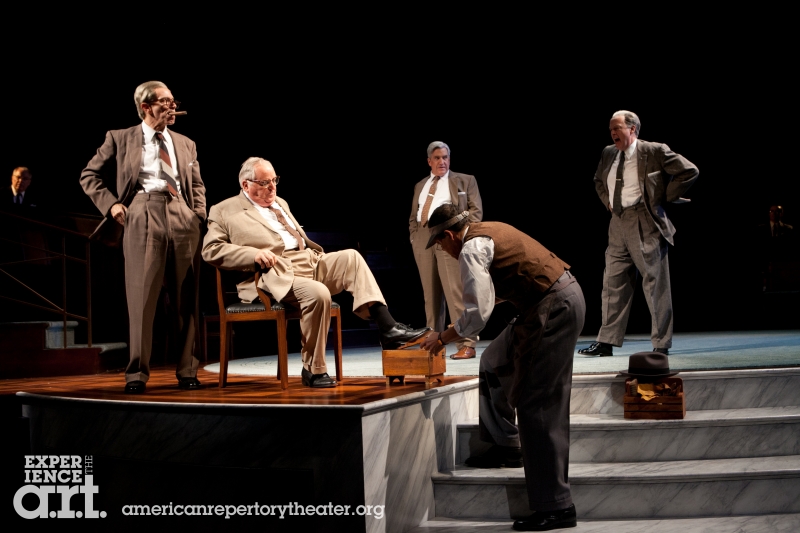“I love you more than my own daddy, but if you get in my way, I’ll crush you.” As theatregoers shuffle into A.R.T.’s Loeb Drama Center in Harvard Square, the hallways are pulsating with discussion of the satisfying conclusion to Bryan Cranston’s brilliant transformation from humble chemistry teacher Walter White to meth kingpin Heisenberg in Breaking Bad. When they exit more than three hours later, they’ll be praising Cranston’s powerful portrayal of another larger than life character who can offer compassion and threats of violence in the same breath – US President Lyndon Baines Johnson.
“All the Way” explores the events that follow JFK’s tragic assassination (besides inspiring our school to change its name in 1966) and the seemingly insurmountable obstacles Johnson must overcome to pass the civil rights legislation Kennedy never could. The play’s real strength, however, lies is Johnson’s southern-fried storytelling and meditations on politics that’ll have government students reaching for their notebooks. For instance, Johnson compares lobbying to propositioning women – if you ask out everyone you’ll get a lot of slaps to the face, but also quite a few yeses. Some of his tales may be a bit racy for a Cambridge audience, but it’s quite tame by LBJ standards. If nothing else, Cranston didn’t expose his genitals like LBJ did with frequency in the Oval Office.
Future community organizers will appreciate the nuanced look at ethical dilemmas facing the student civil rights movement as well as tough questions regarding when to compromise. Civil rights protesters waving signs in the audience reading “Where is Democracy?” served as a healthy reminder that many of the questions of the turbulent 1960s are still relevant today. Fortunately, the prominent role of rhetoric concerning Reds and the Cold War induce nostalgia now, even if FBI Director’s J Edgar Hoover’s wiretapping addiction remains unsettling.
Cambridge being the small town that it is, it came as little surprise to find David Gergen in line for the bar during intermission. Just as LBJ was schooled in bourbon, poker, and politics by longtime Speaker of the House Sam Rayburn, many HKS students are learning politics and leadership from Professor Gergen (the bourbon must usually wait until after class). Gergen dutifully helped me piece together the source materials used by playwright Robert Schenkkan and exchanged guesses about where the second half would take us considering the play seemed to reach a satisfying end before intermission.
Schenkkan deserves credit for covering a lot of important ground, including LBJ’s profound desire to end poverty, distaste of the Kennedy’s and other “Harvard blue-bloods,” unmatched tenacity as a result of his belief that he will die young, and Lady Bird’s devotion to her husband despite his philandering. However, many of the most personal revelations are given only a sentence among an impassioned outburst. I could only imagine that the play would be more satisfying if Schenkkan took an approach similar to the Mark Rothko biography Red which limits its scope to just one art commission.
After premiering at the Oregon Shakespeare Festival and spending a month in Boston, the production will be going all the way to Broadway soon. They’ll be well-served reworking the play’s structure to ensure that the momentum continues into the second half as audiences watch LBJ secure the democratic nomination among compromise with the Mississippi Freedom Democratic Party. Robert Caro’s gripping four volume and counting biography of LBJ showed just how rich in source material the controversial figure can be, so there’s no shortage of options.
Fortunately Cranston will be joining the production in New York, so they can count on his performance to make up for the play’s structural problems. Actor Anthony Hopkins recently wrote in a gushing letter to Cranston, “Your performance as Walter White was the best acting I have seen — ever.” Hopkins will not be disappointed in Cranston’s transformation as LBJ.
With Cranston front and center, this show has all the potential to convince New Yorkers that politics can still be entertaining on the heels of a Mayoral primary election and a grueling government shutdown.

